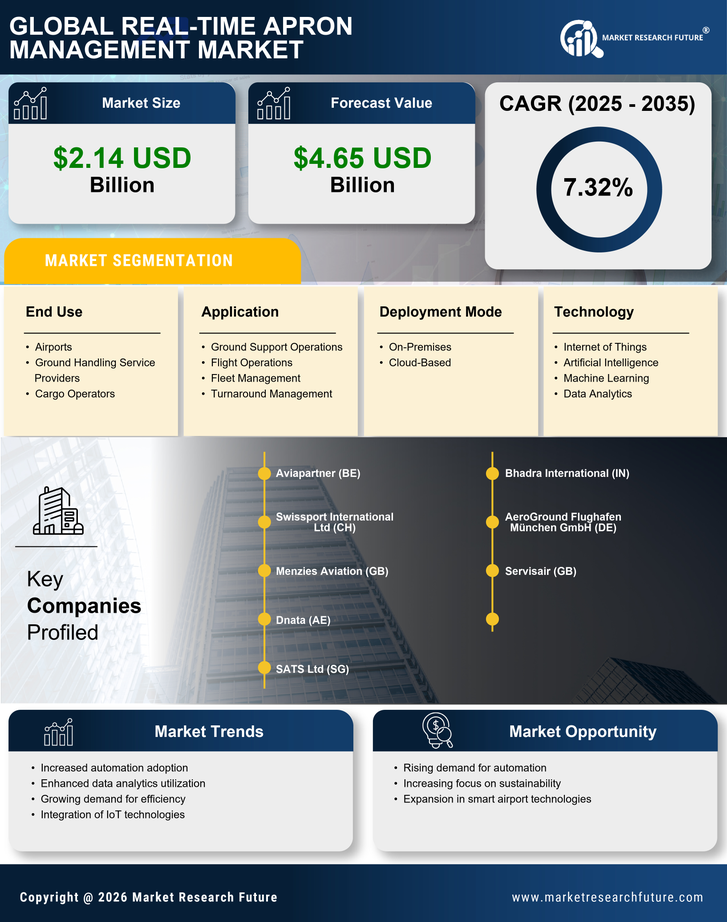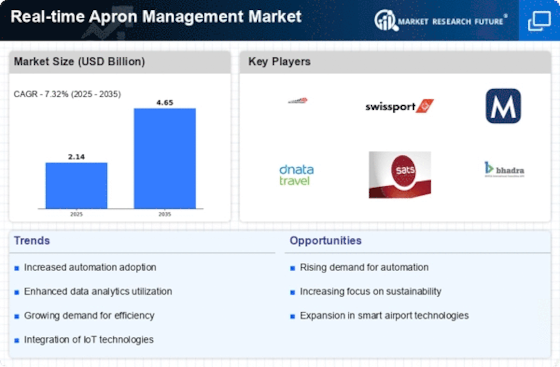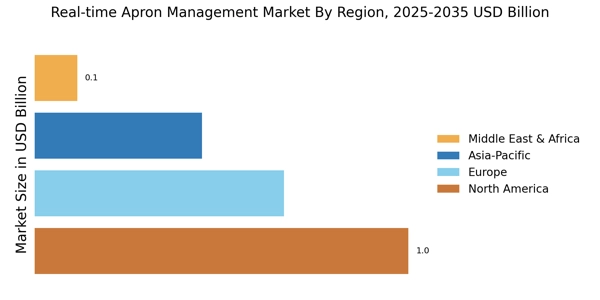Rise of Smart Airports
The rise of smart airports is significantly impacting the Real-time Apron Management Market. Smart airports leverage advanced technologies, including artificial intelligence and big data analytics, to enhance operational efficiency and passenger experience. These airports utilize real-time data to manage apron activities more effectively, leading to improved resource utilization and reduced delays. According to recent projections, the smart airport market is expected to grow at a compound annual growth rate of over 25% in the coming years. This trend indicates a strong demand for innovative apron management solutions that can integrate seamlessly with existing airport infrastructure. As more airports transition to smart operations, the Real-time Apron Management Market is poised for substantial expansion.
Integration of IoT Solutions
The integration of Internet of Things (IoT) solutions into the Real-time Apron Management Market is transforming operational efficiency. IoT devices facilitate real-time data collection and monitoring, enabling airports to optimize apron activities. For instance, sensors can track aircraft movements, baggage handling, and fuel management, leading to reduced turnaround times. According to industry estimates, the adoption of IoT technologies in airport operations could enhance efficiency by up to 30%. This integration not only streamlines processes but also minimizes human error, thereby improving safety and reliability. As airports increasingly adopt these technologies, the Real-time Apron Management Market is likely to witness substantial growth, driven by the demand for smarter, more connected operations.
Demand for Operational Efficiency
The relentless pursuit of operational efficiency is a primary driver in the Real-time Apron Management Market. Airports are under constant pressure to reduce costs while maintaining high service levels. Enhanced apron management systems can lead to significant improvements in resource allocation, scheduling, and overall operational workflows. For example, studies indicate that effective apron management can reduce aircraft turnaround times by as much as 20%, directly impacting airline profitability. As airlines and airport authorities seek to optimize their operations, the demand for advanced apron management solutions is expected to rise, propelling the growth of the Real-time Apron Management Market. This focus on efficiency is not merely a trend but a necessity in an increasingly competitive aviation landscape.
Increased Focus on Sustainability
An increased focus on sustainability is emerging as a key driver in the Real-time Apron Management Market. Airports are increasingly adopting eco-friendly practices to minimize their environmental impact. Real-time apron management systems can contribute to sustainability efforts by optimizing fuel consumption and reducing emissions associated with ground operations. For instance, efficient scheduling and resource allocation can lead to lower fuel usage, which is crucial in the aviation sector's efforts to reduce its carbon footprint. As regulatory pressures and public awareness regarding environmental issues grow, the demand for sustainable apron management solutions is likely to rise. This shift not only aligns with global sustainability goals but also enhances the operational efficiency of airports, thereby benefiting the Real-time Apron Management Market.
Regulatory Compliance and Safety Standards
Regulatory compliance and adherence to safety standards are critical factors influencing the Real-time Apron Management Market. Governments and aviation authorities impose stringent regulations to ensure safety and efficiency in airport operations. Real-time apron management systems assist airports in meeting these regulatory requirements by providing accurate data and analytics for monitoring compliance. For instance, systems that track vehicle movements and personnel can help prevent accidents and ensure that safety protocols are followed. As regulatory frameworks evolve, the demand for solutions that facilitate compliance is likely to grow, thereby driving the Real-time Apron Management Market. This focus on safety not only protects passengers and staff but also enhances the reputation of airports.


















